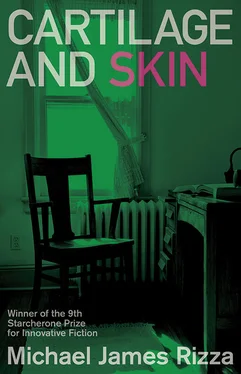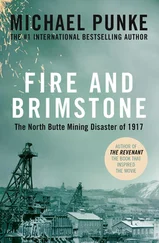I might have been imagining the worst, but then again, even if I could swear my innocence with relentless fervor and constancy, the law was in the hands of fallible men and women, who in their eagerness to settle a terrible crime might contort reason and pervert evidence in order to satisfy their outraged morality, at the expense of my name and freedom. I saw that a crisis was gathering itself around me, and if the woman in my bed wasn’t going to accompany me, then I was forced to leave her.
I would like to say that I simply slipped on my sports jacket and overcoat, knotted the strings of my shoes, and headed out into the wintry night — a fugitive at large but hopefully, in time, forgotten, a name blotted from the annals of humanity. I would like to say that the sleeping woman had a peaceful evening, and though mildly confused by my unexplained disappearance, she was able to resume her life and enjoy all the pleasures of friendship, fortune, and health. In fact, I would like to have never written a word, with no actions to vindicate and no conscience to relieve. But I have been honest thus far, and in the end, maybe none of this matters.
One last look around strengthened my impression that I was trespassing in another man’s home, and if its appearance revealed something of the nature of the man, then his existence was probably as stark, random, and drab as were his mismatched furnishings.
Buttoning my coat up to my chin, and wary of making any sound that would disturb the sleeping woman, I crossed the room toward my desk. The top drawer — which, despite living alone, I kept ritually locked — didn’t yield to my pull as I’d at first feared it would. I felt a moment of relief as I sought in my pocket for the small key on my keyring. Yet, after I opened the drawer, I dropped all of my keys inside, having no further need of them. Suddenly dazed and unthinking, I shut the drawer again. My dread was immediate because in addition to a few items I didn’t care about, the marble-covered notebook was missing; my thoughts in choppy verse had been discovered. The image of the black man’s bloated body pulled up before a large desk, a coffee mug near his meaty hand, and the notebook opened beneath a lamplight, made me cringe — not so much because I could see him angling me into the corners of some standard profile, fitting the pieces of me into his readymade portrait of a madman or pervert, but more so because I felt embarrassed, as though the blunt reality of his body and the humorless severity of his mind would brook no nonsense and deem my literary labors silly.
“Goodbye,” I whispered, barely above a breath, as I threw a final glance toward the short darkened hall that led to spoiled possibilities. “Goodbye.”
I lifted “Footprints” from the wall and found that it fit best in one of the inner pockets of my overcoat. Clicking off the light, I entered the hall and pulled closed the locked door. I passed the gross woman’s apartment, where ages ago I’d stood pining in my dishevelment and discontent, but now I didn’t even raise my head. I had read her online journal, a mess of fragments and compound sentences, and I knew that she was a curt, disgruntled creature — whose father, before she was even born, had vanished in Europe or Canada to escape enlistment in a war he didn’t believe in and a family he didn’t want — and whose mother had wrecked herself on other men, the best of which couldn’t keep his dirty boots off the coffee table nor learn to shut the bathroom door. But these sparse details in her journal appeared as fleeting moments in an otherwise bawdy fantasy world, which her fans, one in particular, adored.
Before I made it to the end of the corridor, I realized I’d made a mistake: The key to my mailbox was now in my desk drawer, so if my mother had sent me money, it was irretrievable.
Wishing I had my hat, I stepped into the cold, and pausing for a moment on the landing, I heard the heavy door latch itself closed behind me. The snow hadn’t eased up at all. As I remembered something in the news, a report about the aged and the homeless freezing to death, I started down the steps. I had a long walk ahead of me, and I hoped that other people were as diligent as my landlord in shoveling the sidewalk.
And I wasn’t even thinking about W. McTeal, when I thought, No, it couldn’t be .
But a fresh set of footprints on the sidewalk ascended the stairs, loitered about the door, and since it was locked, came back down, pausing for an indeterminable moment to gaze up at the building, in the very spot where I presently stood.
No , I thought again as I peered up and down the length of the quiet street, as far as the darkness would permit me. But all was motionless beneath a layer of snow.
And looking down at my feet, I wasn’t even thinking about following the tracks because I was cold and I needed to move and I had no way of telling if my intuition was correct. But from the clear impressions in the snow, I was able to conjure up the waddling figure of the strange man — and the tracks, even though I had no intention of pursuing their course, turned sharply to the left and bid my eyes to follow them into the alley beside my building.
And there he was, in all his absurdity, in the same baseball cap and in the same corduroy jacket that came down to his knees. He was directly beneath the window where the boy had used to receive petty errands from me.
Alarmed, I ducked out of view behind the corner of the building and waited a moment, feeling my heart racing in my chest. But I knew he hadn’t seen me because his back was turned. I wondered if I should circle around the building or simply lower my head and walk in casual strides across the entrance of the alley.
But first, I needed to peek at him again.
Apparently, he had taken the milkcrate — upon which the gross woman had used to sit and hum and watch her clothes drying on a pair of lines — and he had placed it beneath my window.
Still with his back to me, the shadowy figure was fidgeting with something near his waist, and then pulling his hand out from the interior of his jacket, he revealed what appeared to be a hammer. Although the darkness prevented me from descrying the crooked nails driven into the top of it, I suspected it was the very tool I’d seen on his kitchen table. He almost seemed to brandish it for an instant above his head, as though it were some glorious and primitive weapon.
Then, in a gesture that was much sprightlier than I’d imagined the man capable of, he stepped up onto the milkcrate and scrambled the upper part of his body through the window. And before I could fully register what was happening, I watched his legs kick out once, with a tiny jerk, and then slither themselves through the opening. He was gone.
I stood for a second, aghast and terror-stricken.
The cold air bit at my face.
And not yet, not until I plunged my hands into my pockets and started across the opening to the alley, did I envision him walking silently through my living room. I had no idea if my apartment was new to him or if he had frequented it a thousand times before. Perhaps it was just as much his as mine. And I wasn’t even thinking yet, not until I increased my pace and reached the end of the block, that a woman was sleeping in my bed. In my surprise, I had forgotten about Vanessa Somerset. I abruptly stopped in the slushy crosswalk and looked in the direction I’d just come. But there was no going back now. There was nothing I could do.
As my brain played out the various scenarios that were possibly being enacted in my old home, I continued forward. I had to gaze down at the fouled sidewalk. In some scenes, the madman realized his mistake and crept away without making a sound, but in others, the hammer fell before he knew what was beneath the covers, and still more, in other scenes, he peeled back the covers first — and since these were the worst, I tried not to allow myself to imagine them.
Читать дальше












